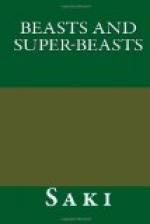Which, of course, was true.
“DOWN PENS”
“Have you written to thank the Froplinsons for what they sent us?” asked Egbert.
“No,” said Janetta, with a note of tired defiance in her voice; “I’ve written eleven letters to-day expressing surprise and gratitude for sundry unmerited gifts, but I haven’t written to the Froplinsons.”
“Some one will have to write to them,” said Egbert.
“I don’t dispute the necessity, but I don’t think the some one should be me,” said Janetta. “I wouldn’t mind writing a letter of angry recrimination or heartless satire to some suitable recipient; in fact, I should rather enjoy it, but I’ve come to the end of my capacity for expressing servile amiability. Eleven letters to-day and nine yesterday, all couched in the same strain of ecstatic thankfulness: really, you can’t expect me to sit down to another. There is such a thing as writing oneself out.”
“I’ve written nearly as many,” said Egbert, “and I’ve had my usual business correspondence to get through, too. Besides, I don’t know what it was that the Froplinsons sent us.”
“A William the Conqueror calendar,” said Janetta, “with a quotation of one of his great thoughts for every day in the year.”
“Impossible,” said Egbert; “he didn’t have three hundred and sixty-five thoughts in the whole of his life, or, if he did, he kept them to himself. He was a man of action, not of introspection.”
“Well, it was William Wordsworth, then,” said Janetta; “I know William came into it somewhere.”
“That sounds more probable,” said Egbert; “well, let’s collaborate on this letter of thanks and get it done. I’ll dictate, and you can scribble it down. ’Dear Mrs. Froplinson—thank you and your husband so much for the very pretty calendar you sent us. It was very good of you to think of us.’”
“You can’t possibly say that,” said Janetta, laying down her pen.
“It’s what I always do say, and what every one says to me,” protested Egbert.
“We sent them something on the twenty-second,” said Janetta, “so they simply had to think of us. There was no getting away from it.”
“What did we send them?” asked Egbert gloomily.
“Bridge-markers,” said Janetta, “in a cardboard case, with some inanity about ‘digging for fortune with a royal spade’ emblazoned on the cover. The moment I saw it in the shop I said to myself ‘Froplinsons’ and to the attendant ‘How much?’ When he said ‘Ninepence,’ I gave him their address, jabbed our card in, paid tenpence or elevenpence to cover the postage, and thanked heaven. With less sincerity and infinitely more trouble they eventually thanked me.”
“The Froplinsons don’t play bridge,” said Egbert.
“One is not supposed to notice social deformities of that sort,” said Janetta; “it wouldn’t be polite. Besides, what trouble did they take to find out whether we read Wordsworth with gladness? For all they knew or cared we might be frantically embedded in the belief that all poetry begins and ends with John Masefield, and it might infuriate or depress us to have a daily sample of Wordsworthian products flung at us.”




